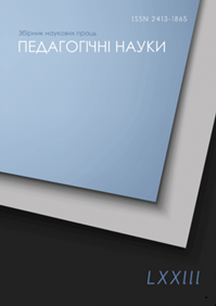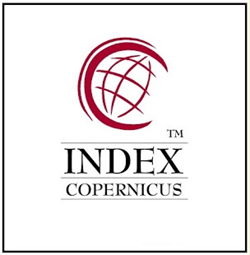Updated: 3/17/2025

The collection of scientific articles “Pedagogical Sciences” is a research and practice journal in the field of education. It was launched by Kherson State University in 2003. Certificate of registration: KB No.7935 of 29 September 2003
Collection of research papers “Pedagogical sciences” is a scientific and practical journal of pedagogical focus area founded in 2013.
Certificate of state registration of the print media: КВ № 23957-13797 ПР dated April 26, 2019 (registered by the State Committee for Television and Radio-Broadcasting of Ukraine).
Periodicity of the journal issue is 4 times a year.
Centre International de l'ISSN: Print 2413-1865, Online 2663-2772.
Collection of research papers “Pedagogical sciences” is a professional edition according to the Order of the Ministry of Education and Science of Ukraine No 241 dated 09.03.2016 (annex No 9).
The collection is posted on the website of Vernadsky National Library: “Collection of research papers “Pedagogical sciences”
The journal is indexed in the international scientometric database Google Scholar.
The journal is included in the international scientometric database Index Copernicus International (the Republic of Poland).
 In accordance with subparagraphs 2.1, 2.2. of the Order of the Ministry of Science and Education of Ukraine “On the Publication of the Results of Dissertations for Obtaining Doctor’s and Candidate’s Scientific Degree” No 1112 dated November 17, 2012, the articles published in the journal are equated to publications in scientific periodicals of other states on dissertation’s issue.
In accordance with subparagraphs 2.1, 2.2. of the Order of the Ministry of Science and Education of Ukraine “On the Publication of the Results of Dissertations for Obtaining Doctor’s and Candidate’s Scientific Degree” No 1112 dated November 17, 2012, the articles published in the journal are equated to publications in scientific periodicals of other states on dissertation’s issue.
The journal covers the current issues of methodology and history of pedagogy, theory and practice of teaching, theory and practice of education, theory and methodology of vocational education, social pedagogy, modern pedagogical technologies and other branches of pedagogical science. The journal also informs about the events of scientific life and pedagogical education in Ukraine; presents reviews of research papers and textbooks on pedagogical subjects.
The editorial board carries out external and internal reviews of all articles. The editorial board of the collection includes leading Ukrainian and foreign scholars. The journal cooperates with the best Ukrainian and foreign HEI, public and local authorities. Such cooperation involves publication of information materials and scientific articles, performance of round tables at the premises of the journal office. The collection contains scientific-theoretical and practical materials on topical general-theoretical and branch pedagogical issues.
We invite all those who wish to collaborate with our journal and offer you to print your articles. This journal is intended not only for scientists, but also for practitioners, who will find a lot of useful information for their activities.
We accept manuscripts from Doctors of Sciences, PhDs, young scientists (post-graduate students) and other authors with higher education who are interested in researching. The Editor and members of the Editorial Board have the responsibility of deciding which submissions will be published as well as of reviewing, editing, shortening or rejecting. The author is responsible for all the information, data and other materials given in the article. Material submitted to the “Pedagogical Sciences” will not be reprinted without the author's or Editor’s written consent
Sections of the journal:
-
Methodology and history of pedagogy
-
Theory and practice of teaching
-
Theory and practice of education
-
Theory and methodology of vocational education
-
Social pedagogy
-
Modern pedagogical technologies
The collection also informs about the events of scientific life and pedagogical education in Ukraine.
It provides reviews of scientific papers and textbooks on pedagogical subject.
.
REQUIREMENTS FOR ARTICLES COMPOSITION
General requirements:
The order of structural elements in the article:
1. You should indicate in article’s language:
• title
• full name of article’s author (-s) (maximum two persons);
• scientific degree, academic rank (if any), post, place of employment/study, e-mail;
• ORCID ID code. If the author doesn’t have an account in ORCID it is obligatory to log in at http://orcid.org/;
• summary and key words;
Summary volume is 1800 symbols without spaces (200-300 words). The following structure is necessary for the summary: Purpose, Results and Conclusions. The summary should include 5-10 key words or words combinations, and none of them can repeat article’s title.
2. You should indicate in English:
• title
• full name of article’s author (-s) (maximum two persons);
• scientific degree, academic rank (if any), post, place of employment/study, e-mail;
• ORCID ID code. If thex author doesn’t have an account in ORCID it is obligatory to log in at http://orcid.org/;
• summary and key words;
Summary volume is 1800 symbols without spaces (200-300 words). The following structure is necessary for the summary: Purpose, Results and Conclusions. The summary should include 5-10 key words or words combinations, and none of them can repeat the article’s title.
3. Article text:
Introduction is a necessary part of the paper where the author indicates topic’s novelty and relevance of scientific solutions. The purpose should be clearly noted along with scientific tasks. It is essential to mark methodology, logic presentation of material under examination.
The main text should be divided into information sections with separate headings (up to 4-6 words).
The article should have Conclusions which present detailed conclusions based on the study’s results and prospects for further research in this focus area.
4. Bibliography.
Bibliographic entry is executed in accordance with the National Standard of Ukraine DSTU 8302: 2015 Information and documentation. Bibliographic reference. General principles and rules of composition”. The article may be rejected due to improper execution of sources.
5. References.
It is executed in accordance with АРА (APA Style Reference Citations). There is an author (transliteration), title (transliteration), title (in square brackets translated into English), source name, output data (city in English), publishing house (transliteration).
For example:
1. Doktorovych, M.O. (2010). Nepovna sim’ia: osoblyvosti roboty sotsialnoho pedahoha [An incomplete family: the particulars of the work of a social teacher]. Kyiv: Shkilnyi svit [in Ukrainian].
Transliteration of names and surnames from Ukrainian is executed in accordance with the requirements of the Resolution of Cabinet of Ministers of Ukraine “On Normalization of Transliteration of the Ukrainian Alphabet by Means of Latin Alphabet” dated January 27, 2010, No 55.
Transliteration from Russian is executed in accordance with GOST 7.79-2000. System of Standards on Information, Librarianship and Publishing. Rules of Transliteration of Cyrillic Script by Latin Alphabet.
Rules for execution of reference to literature and bibliographic entry:
References to literature is marked exclusively in round brackets according to the example:
Відсутність батьків протягом великого проміжку часу є депривуючим чинником, який впливає на розвиток особистості дитини (Докторович, 2010).
If source pages are indicated, they are marked via two spot, e.g. (Бондаренко, 2002: 25–27).
Technical requirements:
• article volume – 10-20 pages, A4, typed in Microsoft Word;
• font – Times New Roman, 14 pt.; space lining – 1,5; all fields – 20 mm;
• if the article have tables and (or) figures, they should by compacts, have a title, font – Times NewRoman, 12 pt. Mathematical formulas must be thoroughly checked and clearly printed. The number of tables, formulas and illustrations should be minimal and relevant. Figures and tables on album sheets are not accepted.
Language: Ukrainian, English, Russian.
• Articles of Doctors of Sciences, Candidate of Sciences, young scholars (postgraduate students, students) as well as of other persons who have higher educational attainment and are engaged in scholarly endeavor are accepted for publication.
• Authors submit articles that are own original researches which meet the rules of citation and references. Submission of false information or plagiarism is unacceptable and unethical. In addition, it is accepted articles that have not been published in other journals.
• Editorial board reserves the right to review, edit, reduce and reject articles.
• The author is responsible for the reliability of facts, statistics and other information. Reprinting (re-editing) of papers is possible only with consent of the author and the editorial office.
Приклад оформлення статті
УДК 37.014.623
3. Теорія і практика виховання
ПЕРЕДУМОВИ ВИКОРИСТАННЯ ІНТЕРНЕТ-РЕСУРСІВ В ЯКОСТІ ЗАСОБІВ ДУХОВНО-МОРАЛЬНОГО ВИХОВАННЯ СТУДЕНТІВ
Лаппо Вікторія Володимирівна,
кандидат педагогічних наук, доцент,
доцент кафедри педагогіки і психології
Прикарпатський національний університет імені Василя Стефаника
E-mail
orcid.org/___________
Анотація українською мовою.
Обсяг: 1800 знаків без пробілів (250-300 слів).
Ключові слова: 5–10 слів чи словосполучень.
REREQUISITES OF USE INTERNET RESOURCES AS A MEANS OF SPIRITUAL AND MORAL EDUCATION OF STUDENTS
Lappo Viktoriia Volodymyrivna,
Candidate of Pedagogical Sciences, Associate Professor,
Associate Professor at the Department of Pedagogy and Psychology
Vasyl Stefanyk Precarpathian National University
E-mail
orcid.org/___________
Анотація англійською мовою.
Обсяг: 1800 знаків без пробілів (250-300 слів).
Key words: 5–10 слів чи словосполучень.
Вступ (вказується новизна теми та актуальність наукових рішень).
1. Теоретичне обґрунтування проблеми
2. Методологія та методи
3. Результати та дискусії
Висновки (розгорнуті конкретні висновки за результатами дослідження і перспективи подальших досліджень у цьому напрямку).
ЛІТЕРАТУРА:
1. Докторович М.О. Неповна сім’я: особливості роботи соціального педагога. Київ : Шкільний світ, 2010. 128 с.
REFERENCES:
1. Doktorovych, M.O. (2010). Nepovna sim’ia: osoblyvosti roboty sotsialnoho pedahoha [An incomplete family: the particulars of the work of a social teacher]. Kyiv: Shkilnyi svit [in Ukrainian].
Submitted the article to editorial office of the journal “Collection of research papers “Pedagogical Sciences”, it is subjected to a double-blind review: reviewers do not know who is an author, the authors do not know who is a reviewer.
The review is carried out by one of the members of the editorial board, who is a respected expert in knowledge related to the subject of the submitted paper.
Impartial reviewers carefully evaluate the quality of the manuscript including use of their personal criteria.
In the process of reviewing, reviewers evaluate the quality of work based on:
-
compliance with the structural requirements of a scientific article;
-
compliance with editorial conventions: titles, summaries and references must be clear, informative, accurate, complete, the authors must be identified according to institutional affiliation and address;
-
compliance with the technical requirements for publication of the article in the journal;
-
elements of originality consisting of:
-
novelty of formulated and interpreted ideas;
-
newness of the views of a researcher;
-
“freshness” of used academic language;
-
force of arguments which lies in the text of paper in order to entice readers;
-
individualization of the text which is represented by introducing the “voice” of the author, which differs from other voices.
After reviewing the authors receive a letter of confirmation relatively the article acceptance for printing.
1. information about the author;
2. the article designed in accordance with requirements.
After review of a publication and a positive test of academic integrity, you should send a scanned electronic copy of payment confirmation of editing fee.
Attention! Articles of the students do not accept the editors for printing.
Materials should be sent in electronic form at address:
The example of files names: Popov_Author_Information, Popov_Article, Popov_Payment.
Postal mailing of the journal is scheduled within a month after the recommendation to be published by the Academic Council of the University.
INFORMATION ABOUT THE AUTHOR SAMPLE
|
Surname, name (initials) of an author(s)
|
|
|
Information about a research advisor (surname, name (initials, academic degree and rank, position) is stated if an author does not have an academic degree
|
|
|
Journal Category
|
|
|
Place of work (study), academic degree and rank, position
|
|
|
Telephone
|
|
|
E-mail
|
|
|
Postal address (Example: Vul. Suvorov, b.3, kv. 6, Kherson 73000, Ukraine, where Vul. is the name for the word street in Ukrainian; Suvorov – the name of the street; b. – house number, kv. – apartment number, 73000 – zip code, Kherson – city, Ukraine – country)
|
|
Contact information
Editors office of the collection of research papers “Pedagogical sciences”
Kherson State University
27 Universytetska St., office 313, Kherson
Contact number: +38 (068) 813 02 68
E-mail:
Website of the journal: www.ps.stateuniversity.ks.ua
Website of the university: www.kspu.edu